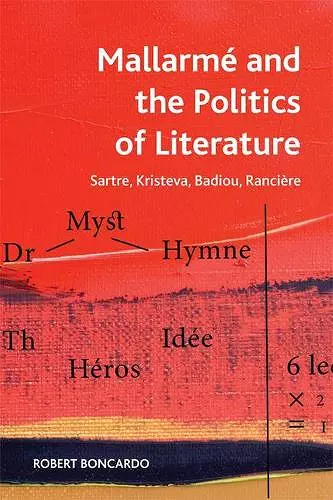Mallarmé and the Politics of Literature
Sartre, Kristeva, Badiou, Rancière
Format:Hardback
Publisher:Edinburgh University Press
Published:16th Jan '18
Currently unavailable, and unfortunately no date known when it will be back

Robert Boncardo investigates how Stéphane Mallarmé, one of modernity’s most ingenious yet obscure poets, became an object of major political significance for French intellectuals. He asks how this most refined and seemingly aristocratic of poets became the writer of choice for leftist intellectuals and reflects on the ambivalent relation between literature and its political destiny in modernity. With in-depth studies of Jean-Paul Sartre, Julia Kristeva, Alain Badiou and Jacques Rancière, along with shorter analyses of Jean-Claude Milner and Quentin Meillassoux, he situates Mallarmé within the philosophical and political projects of some of France’s greatest thinkers.
The name Mallarmé has become a tool for the praise and condemnation of poetry. In French philosophy, he is associated with the intoxicating idea of poetry as politically efficacious, and the counter-charge of effete elitism. In this lively and impressive re-telling, we see how this poet becomes a magnet for a stunning cascade of delirious praise and vilification. Robert Boncardo convincingly shows that despite the insights of the French obsession with Mallarmé, we need new ways to formulate the links between politics and literature. * Alison Ross, Monash University *
Robert Boncardo’s study provides a clearly written and helpful guide to writings on Stéphane Mallarmé by several key thinkers of the twentieth century who engaged his thought in their own efforts to reshape the relation of literature to politics. The book delivers more than it promises in the title, since in addition to a chapter on each of the writers mentioned in the subtitle, there is also a short chapter on Jean-Claude Milner, and the conclusion substantially engages the ideas of Quentin Meillassoux … This book will serve as an excellent introduction to the work of all these theorists on Mallarmé, and is of most value in the chapters, such as those on Sartre and Badiou, that clearly trace the evolution and changes in approach over the course of a single thinker’s career and the extent to which there is continuity or rupture in that development. Boncardo offers many important insights both into Mallarmé’s oeuvre and into the ways in which that oeuvre helps these theorists reorient and remap the very definition of what we understand the political to be, in its relationship to modern literature and beyond. -- Joseph Acquisto, University of Vermont * H-France Review *
ISBN: 9781474429528
Dimensions: unknown
Weight: 552g
288 pages